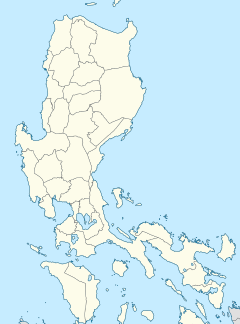Abad Santos station
This article needs additional citations for verification. (February 2024) |
 | |||||||||||
| General information | |||||||||||
| Other names | J. Abad Santos | ||||||||||
| Location | Rizal Avenue, Tondo Manila, Metro Manila, Philippines | ||||||||||
| Coordinates | 14°37′50.22″N 120°58′53.09″E / 14.6306167°N 120.9814139°E | ||||||||||
| Owned by | Department of Transportation Light Rail Manila Corporation | ||||||||||
| Line(s) | LRT Line 1 | ||||||||||
| Platforms | 2 (2 side) | ||||||||||
| Tracks | 2 | ||||||||||
| Construction | |||||||||||
| Structure type | Elevated | ||||||||||
| Other information | |||||||||||
| Station code | AS | ||||||||||
| History | |||||||||||
| Opened | May 12, 1985 | ||||||||||
| Services | |||||||||||
| |||||||||||
| |||||||||||
Abad Santos station, also known as J. Abad Santos station,[1] is an elevated Light Rail Transit (LRT) station located on the LRT Line 1 (LRT-1) system in Manila, Philippines.[2] The station serves Tondo and Santa Cruz, and is situated on Rizal Avenue. The station is named after the nearby Abad Santos Avenue, which in turn, is named after José Abad Santos, Chief Justice of the Supreme Court of the Philippines who was executed by the Japanese invading forces during World War II.
Abad Santos station serves as the sixth station for LRT-1 trains headed to Dr. Santos and as the twentieth station for trains headed to Fernando Poe Jr.[citation needed]
History
[edit]Abad Santos station was opened to the public on May 12, 1985, as part of the Rizal Line, which extended the LRT northward to Monumento.[1][3]
Transportation links
[edit]Like its neighbor R. Papa, commuters can take the many jeepneys or taxis to Abad Santos station. Buses and UV Express that ply Rizal Avenue also stop near the station. Tricycles are available outside the station.[citation needed]
See also
[edit]References
[edit]- ^ a b "The LRT as a Component of Metro Manila's Transport Systems" (PDF). Philippine Planning Journal. XVII (1). School of Urban and Regional Planning, University of the Philippines: 33-45. October 1985. Retrieved November 16, 2024.
- ^ "Distance Between Stations". Light Rail Transit Authority. Retrieved 2024-02-01.
- ^ "Railway Operations". Light Rail Transit Authority. Retrieved November 16, 2024.




